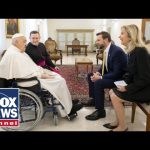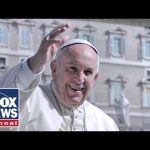The passing of Pope Francis at age 88 has brought a somber mood to Rome and the global Catholic community, marking the end of a papacy that was as controversial as it was consequential. Despite his frail health, the pontiff made a final public appearance on Easter Sunday, blessing the faithful and delivering a message that, true to form, emphasized social justice and migration issues that often put him at odds with many in the conservative world. His last significant meeting was with U.S. Vice President JD Vance, a Catholic convert known for his strong border security stance, highlighting the ongoing ideological rifts that defined Francis’s tenure.
Pope Francis’s legacy is undeniably complex. While he was hailed by progressives for his focus on climate change, migration, and economic inequality, these same priorities frustrated many traditional Catholics and conservatives. His repeated calls for open borders and his criticism of national sovereignty, especially in the United States, were seen by many as political overreach rather than spiritual guidance. Conservatives have long argued that the Church should prioritize defending doctrine and moral clarity over wading into divisive political debates, especially those that undermine the rule of law and national security.
The coming days will see the Vatican enveloped in tradition as the cardinals gather for the conclave to select the next pope. There is palpable hope among conservatives that the Church will pivot back toward orthodoxy and moral clarity. Leading candidates include figures like Cardinal Peter Erdo of Hungary and Cardinal Marc Ouellet of Canada, both of whom have taken strong stances in defense of traditional marriage and have shown reluctance to embrace the progressive agenda that defined Francis’s papacy. The conclave process itself, steeped in secrecy and prayer, serves as a reminder of the Church’s enduring commitment to its foundational principles, despite the turbulence of recent years.
Francis’s papacy was also marked by a contentious relationship with world leaders, particularly with President Donald Trump. The pope’s public criticism of Trump’s immigration policies and his willingness to engage with left-leaning leaders like Barack Obama and Joe Biden underscored his preference for globalist solutions over national interests. While some praised his efforts to bridge divides, many conservatives saw a pope who too often aligned himself with political movements that run counter to the Church’s historic teachings on life, family, and religious liberty.
As the Catholic Church stands at a crossroads, the conclave’s decision will not only shape the future of 1.3 billion Catholics but also send a message to the world about the Church’s direction. For many conservatives, the hope is that the next pope will restore a focus on timeless doctrine, defend religious freedom, and resist the temptation to chase fleeting political trends. The legacy of Pope Francis, for all its controversy, sets the stage for a much-needed course correction—one that could bring unity, clarity, and renewed strength to the world’s largest Christian community.




